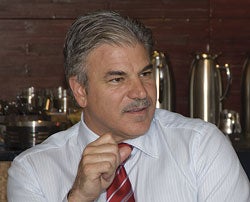Student Wellness Center Lands Healthy Donation

 Michael Fascitelli, Class of ’78 and his wife, Beth, have donated $1 million to URI’s Making A Difference campaign to help create a student wellness center on campus, a facility designed to foster personal health and promote community. The former two-story Roger Williams Dining Hall will undergo a $5.5 million conversion into a wellness center located in the heart of the residential life community.
Michael Fascitelli, Class of ’78 and his wife, Beth, have donated $1 million to URI’s Making A Difference campaign to help create a student wellness center on campus, a facility designed to foster personal health and promote community. The former two-story Roger Williams Dining Hall will undergo a $5.5 million conversion into a wellness center located in the heart of the residential life community.
“It is always a proud day for the University when a gift of this size is received,” said President Robert L. Carothers. “Our new wellness center will be a centerpiece in our growing living-learning experience. We are grateful to Mike and Beth for recognizing the importance of such a center.”
Wellness centers, a growing trend on college campuses, help to retain and engage students. When URI surveyed students about their priorities, they placed a wellness center at the top of their list. The new center will include cardio-vascular equipment, aerobics and dance studio space, and will offer wellness workshops.
Fascitelli grew up in North Providence, the son of a tailor and a seamstress. He was the first in his Italian-American family to attend college. He earned an industrial engineering degree from URI and graduated from Harvard Business School in 1982.
He worked at McKinsey and was a partner at Goldman Sachs before joining Vornado Realty Trust as president in 1996. Today, Vornado owns and manages more than 60 million square feet of office space nationwide, most notably in New York City and Washington, D.C.
“My wife, Beth, and I are delighted to be able to give this gift. It will benefit the school and honor my mother, Anna Fascitelli, who was an extraordinary person” says the alumnus. “URI was a terrific experience for me, and it will always have a special place in my heart.
“To give back to URI, honor my mother and underscore our family’s commitment to education is a unique opportunity. With the new wellness center, students will be better prepared to build fuller lives for themselves and their communities.”
 Home
Home Browse
Browse Close
Close Events
Events Maps
Maps Email
Email Brightspace
Brightspace eCampus
eCampus


